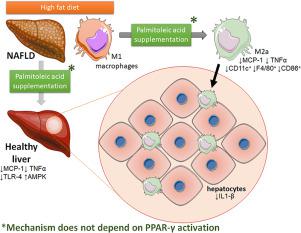Biochimica et Biophysica Acta (BBA) - Molecular and Cell Biology of Lipids ( IF 4.8 ) Pub Date : 2020-07-30 , DOI: 10.1016/j.bbalip.2020.158776 Camila O Souza 1 , Alexandre A S Teixeira 1 , Luana Amorim Biondo 1 , Loreana Sanches Silveira 1 , Cristiane N de Souza Breda 2 , Tarcio T Braga 2 , Niels O S Camara 2 , Thiago Belchior 3 , William T Festuccia 3 , Tiego A Diniz 1 , Glaucio Monteiro Ferreira 4 , Mario Hiroyuki Hirata 4 , Adriano B Chaves-Filho 3 , Marcos Y Yoshinaga 5 , Sayuri Miyamoto 5 , Philip C Calder 6 , Jaswinder K Sethi 6 , José C Rosa Neto 1

|
Palmitoleic acid (POA, 16:1n-7) is a lipokine that has potential nutraceutical use to treat non-alcoholic fatty liver disease. We tested the effects of POA supplementation (daily oral gavage, 300 mg/Kg, 15 days) on murine liver inflammation induced by a high fat diet (HFD, 59% fat, 12 weeks). In HFD-fed mice, POA supplementation reduced serum insulin and improved insulin tolerance compared with oleic acid (OA, 300 mg/Kg). The livers of POA-treated mice exhibited less steatosis and inflammation than those of OA-treated mice with lower inflammatory cytokine levels and reduced toll-like receptor 4 protein content. The anti-inflammatory effects of POA in the liver were accompanied by a reduction in liver macrophages (LM, CD11c+; F4/80+; CD86+), an effect that could be triggered by peroxisome proliferator activated receptor (PPAR)-γ, a lipogenic transcription factor upregulated in livers of POA-treated mice. We also used HFD-fed mice with selective deletion of PPAR-γ in myeloid cells (PPAR-γ KOLyzCre+) to test whether the beneficial anti-inflammatory effects of POA are dependent on macrophages PPAR-γ. POA-mediated improvement of insulin tolerance was tightly dependent on myeloid PPAR-γ, while POA anti-inflammatory actions including the reduction in liver inflammatory cytokines were preserved in mice bearing myeloid cells deficient in PPAR-γ. This overlapped with increased CD206+ (M2a) cells and downregulation of CD86+ and CD11c+ liver macrophages. Moreover, POA supplementation increased hepatic AMPK activity and decreased expression of the fatty acid binding scavenger receptor, CD36. We conclude that POA controls liver inflammation triggered by fat accumulation through induction of M2a macrophages independently of myeloid cell PPAR-γ.
中文翻译:

棕榈油酸通过促进骨髓细胞的 PPAR-γ 非依赖性 M2a 极化来减少高脂肪饮食引起的肝脏炎症。
棕榈油酸 (POA, 16:1n-7) 是一种脂因子,具有治疗非酒精性脂肪肝的潜在营养用途。我们测试了 POA 补充剂(每日口服灌胃,300 毫克/公斤,15 天)对高脂肪饮食(HFD,59% 脂肪,12 周)诱导的小鼠肝脏炎症的影响。在 HFD 喂养的小鼠中,与油酸(OA,300 mg/Kg)相比,POA 补充剂可降低血清胰岛素并改善胰岛素耐受性。与 OA 治疗小鼠相比,POA 治疗小鼠的肝脏表现出较少的脂肪变性和炎症,炎症细胞因子水平较低,toll 样受体 4 蛋白含量降低。POA 在肝脏中的抗炎作用伴随着肝脏巨噬细胞 (LM, CD11c + ; F4/80 + ; CD86 +),这种效应可能由过氧化物酶体增殖物激活受体 (PPAR)-γ 触发,PPAR 是一种在 POA 治疗小鼠肝脏中上调的脂肪生成转录因子。我们还使用了 HFD 喂养的小鼠,选择性删除了骨髓细胞中的 PPAR-γ (PPAR-γ KO LyzCre+ ),以测试 POA 的有益抗炎作用是否依赖于巨噬细胞 PPAR-γ。POA 介导的胰岛素耐受性改善密切依赖于骨髓 PPAR-γ,而 POA 抗炎作用包括减少肝脏炎症细胞因子在携带 PPAR-γ 缺陷的骨髓细胞的小鼠中得以保留。这与 CD206 + (M2a) 细胞的增加和 CD86 +和 CD11c + 的下调重叠肝脏巨噬细胞。此外,POA 补充剂增加了肝脏 AMPK 活性并降低了脂肪酸结合清道夫受体 CD36 的表达。我们得出结论,POA 通过独立于骨髓细胞 PPAR-γ 诱导 M2a 巨噬细胞来控制由脂肪积累引发的肝脏炎症。



























 京公网安备 11010802027423号
京公网安备 11010802027423号